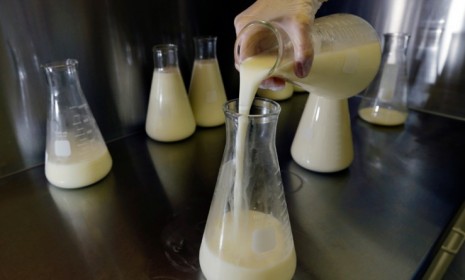The increasing prevalence of new moms sharing breast milk: A guide
More and more, moms are turning to donors to make sure babies get enough breast milk. And if they can't find them at a milk bank, they're trying Facebook

A free daily email with the biggest news stories of the day – and the best features from TheWeek.com
You are now subscribed
Your newsletter sign-up was successful
Doctors overwhelmingly recommend that new mothers feed their babies breast milk, but owing to health problems and other obstacles, some women just can't do it on their own. But now more than ever, new moms are finding ways to share breast milk to give more babies a shot at the numerous health benefits that it can provide. How widespread is this new parenting trend, and how can a new mom take part? Here, a brief guide:
How much milk sharing is going on?
In 2011, the Human Milk Banking Association of North America distributed 2.18 million ounces of breast milk — up from 1.8 million ounces in 2010 and 1.5 million ounces in 2009. There are 12 banks associated with the HMBANA, with several more planned — in Orlando; Portland, Ore.; and Missoula, Mont.; along with another that will serve both Wisconsin and Illinois. Most of the existing banks are nonprofits, but their milk isn't free. They have to screen donated milk for bacteria and viruses, pasteurize it, and screen the blood of their donors, so they charge $3 to $5 per ounce to cover costs.
The Week
Escape your echo chamber. Get the facts behind the news, plus analysis from multiple perspectives.

Sign up for The Week's Free Newsletters
From our morning news briefing to a weekly Good News Newsletter, get the best of The Week delivered directly to your inbox.
From our morning news briefing to a weekly Good News Newsletter, get the best of The Week delivered directly to your inbox.
Is there enough milk to go around?
No. The limited supply at milk banks goes first to moms with sick and premature infants, or delayed lactation. Donated milk can save lives in premature or low-birth-weight babies by preventing a dangerous bowel condition called necrotizing enterocolitis. Because it's such a precious resource, the breast milk at banks requires a prescription from a doctor. "We're just struggling to keep up," says Pauline Sakamoto, executive director of Mother's Milk Bank in San Jose, Calif. "Our freezers are empty, but the demand is skyrocketing. It's just exponentially growing, so it's imperative for us to find more milk."
How else can new moms find milk?
Through social media, of course. Some organizations, such as Human Milk 4 Human Babies, organize breast milk swaps through Facebook. There are about 120 Facebook pages, including at least one for every state, where moms can go to find a milk donor. "You can find a mom within a few miles of home," Emma Kwasnica, founder of Human Milk 4 Human Babies, tells USA Today. Some participants meet at play groups and hand over coolers of frozen breast milk to moms who need it. "It's very different than the anonymity of sharing milk online and shipping it out." But some moms don't have someone close by they can get to know, so they have to rely on the information available to them about the donor online.
A free daily email with the biggest news stories of the day – and the best features from TheWeek.com
Is that safe?
While it can be comforting to know the person the milk is coming from, getting any milk through casual sharing carries health risks, experts say, as the milk isn't screened and can carry bacteria and viruses, including HIV. Mothers who want to share their breast milk through an organization usually have to answer detailed questions about their health, provide blood samples, and get their doctors' approval to donate. Still, with demand far exceeding milk banks' supplies, for some moms, casual milk sharing is the only real option to find breast milk for the babies.
-
 The mystery of flight MH370
The mystery of flight MH370The Explainer In 2014, the passenger plane vanished without trace. Twelve years on, a new operation is under way to find the wreckage of the doomed airliner
-
 5 royally funny cartoons about the former prince Andrew’s arrest
5 royally funny cartoons about the former prince Andrew’s arrestCartoons Artists take on falling from grace, kingly manners, and more
-
 The identical twins derailing a French murder trial
The identical twins derailing a French murder trialUnder The Radar Police are unable to tell which suspect’s DNA is on the weapon